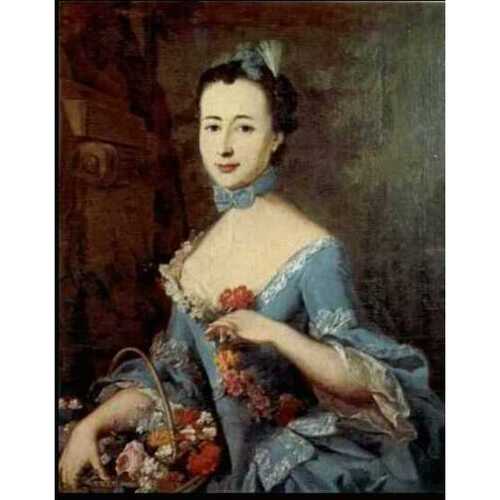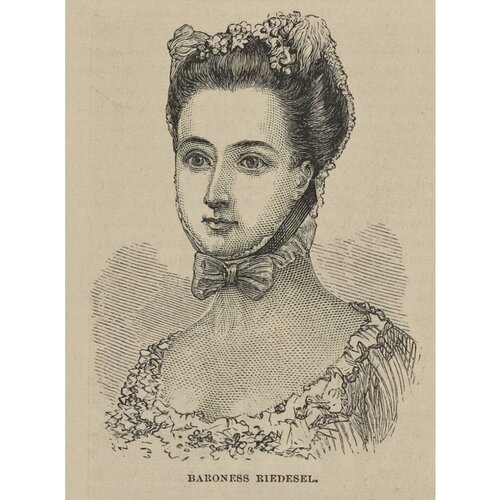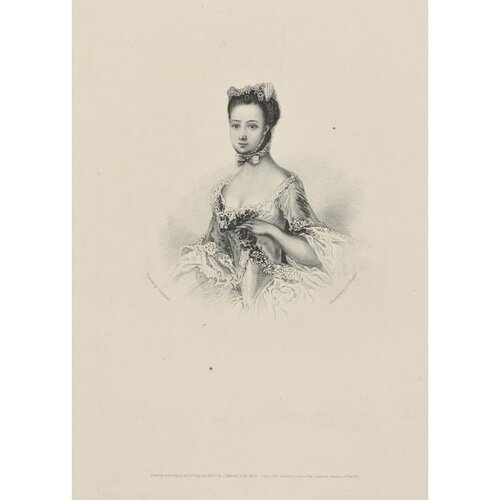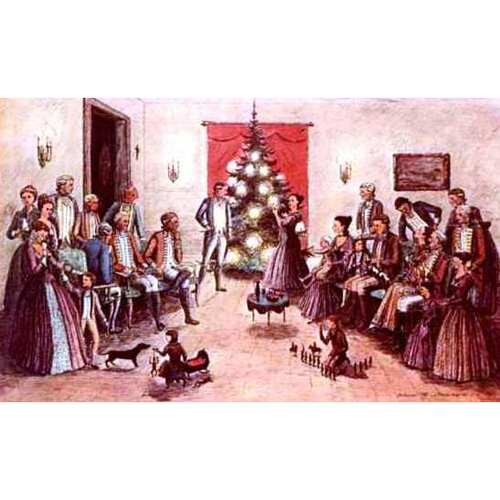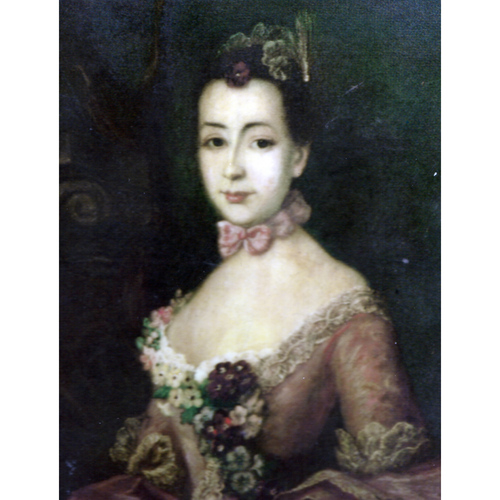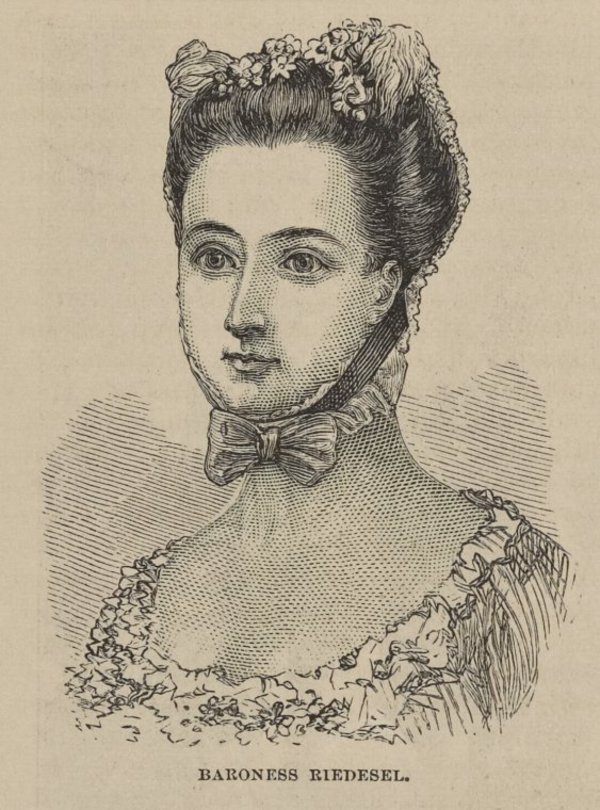
Source: Link
MASSOW, FRIEDERIKE CHARLOTTE LOUISE VON (Riedesel, Freifrau zu Eisenbach), author; b. 11 July 1746 in Brandenburg (German Democratic Republic), daughter of Hans Jürgen Detloff von Massow, lieutenant-general in the Prussian army and commissary-in-chief under Frederick II, King of Prussia, and Miss von Crausee; d. 20 May 1808 in Berlin, and was buried in the Riedesel family vault at Lauterbach (Federal Republic of Germany).
Friederike Charlotte Louise von Massow was about 13 years old when she first met Friedrich Adolph Riedesel, a 21-year-old captain in the Brunswick cavalry and aide-de-camp to the Duke of Brunswick. Although their marriage on 21 Dec. 1762 at Wolfenbüttel (Federal Republic of Germany) was arranged by their families, with Brunswick playing a role in the negotiations, the match was clearly one of love. After the marriage Riedesel left on a tour of duty, while Friederike went to live in Berlin. There in 1766 she gave birth to a boy, the first of nine children they would have; three, including the first two, were to die in infancy. Riedesel was stationed at Wolfenbüttel, where he eventually bought a home and where the couple settled. Described by a Prussian chamberlain in 1766 as “very young, very good-looking,” Friederike was also very forceful. “You have the best character in the world,” her husband wrote in 1776, “but often are so unreasonable as not to hide the hate which you have for important men, and you speak in the presence of everybody. . . . You know that we have many enemies and people profit by your frankness and intrigue against you and me.”
By January 1776 Riedesel had already, at the age of 38, reached the rank of colonel. When, that month, Great Britain concluded a treaty with the duchy of Brunswick for the hiring of troops to fight against the rebellious American colonies, he was appointed commander of the first contingent to be sent to America. He left Wolfenbüttel on 22 February and that night he wrote Friederike: “Never have I known greater suffering than upon my departure this morning. My heart was broken, and had I had the opportunity of going back, who knows what I might have done!” After announcing his promotion to major-general, he added, “And now, my own Mrs. General, take good care of yourself so that you can join me immediately after your confinement.” The irrepressible Friederike had decided that she would accompany her husband. To her mother, who had formally ordered her to stay at Wolfenbüttel, Friederike replied: “To remain here when the best, the tenderest of husbands gave me permission to follow him would have been impossible for me. Duty, love, and conscience forbade me. It is the duty of a wife to foresake all and follow her husband.”
On 14 May 1776 Friederike left Brunswick, accompanied by her three daughters, aged four years, two years, and ten weeks. From her departure Friederike kept a journal in which she recounted her adventures and observations. After a year of frustrating delay in England, the family sailed for Quebec, arriving early on the morning of 10 June 1777; when news of Friederike’s arrival reached the city, “all the ships lying in harbour fired their cannon,” and at noon a boat “with twelve sailors dressed in white with silver helmets and green sashes” was sent to fetch her. Familiar with The history of Emily Montague . . . (4v., London, 1769), the novel by Frances Brooke [Moore*] set in the colony, Friederike in her turn noted that “Quebec presents a fine view from the water,” and at first fully agreed with “the lovely description of it” in Emily Montague’s letters. Once landed, however, she found the city “as ugly as can be and very inconvenient to walk about in, for one has to climb mountains when walking in its streets.”
Riedesel, who had been stationed at Trois-Rivières, had already left to join the forces of Major-General John Burgoyne* in preparation for an invasion of the American colonies. Friederike pressed on immediately from Quebec, finally rejoining him at Chambly, where they spent two days together in mid June. Since they could see little of each other while Riedesel was occupied with plans for the campaign, Friederike settled at Trois-Rivières and remained there for two months. Among her friends were vicar general Pierre Garreau*, dit Saint-Onge, cheerful, sociable, and “a man of intelligence,” as well as Garreau’s “so-called ‘cousin.’” In a general reference, probably to the vicars general, Friederike wrote of later hearing that “each of these gentlemen had a similar ‘cousin’ as housekeeper and that almost every year these ‘cousins’ were obliged, for certain reasons, to leave town for a while in order to avoid causing scandal.” She frequently visited, and dined with, the Ursulines, whom she found charming company. She described Canadians of the region as friendly and recorded her observations of their houses and way of life.
In August 1777 Friederike, taking the children, joined her husband on Burgoyne’s expedition, reaching the force just before communications with it were cut off by the Americans. Approximately 2,000 women accompanied Burgoyne’s troops at one time or another. Friederike found herself in a group of officers’ wives, who followed at some distance behind the first line of advance. She was close enough to the front, however, to observe the battle of 19 September in the vicinity of Freeman’s Farm, N.Y., and, she wrote, “knowing that my husband was taking part in it, I was filled with fear and anguish and shivered whenever a shot was fired, as nothing escaped my ear.” At the battle of Bemis Heights on 7 October, “the firing grew heavier and heavier until the noise was frightful. It was a terrible bombardment,” she noted, “and I was more dead than alive!” The arrival, at the house in which Friederike was staying, of wounded officers, some of whom were good friends, heightened her fears for her husband’s life. At one point during the British retreat to Saratoga (Schuylerville), in an area under heavy bombardment, she was torn between accompanying her daughters to safety, as an officer had ordered her to do, or waiting for her husband to join her and consequently being separated from her children. “He knew the weakest spot in my armor and thus persuaded me to get into the calash,” she wrote, “and we drove away.” Like her husband, Friederike condemned Burgoyne’s dilatoriness and nonchalance during the retreat. “In fact,” she recorded, “Burgoyne liked having a jolly time and spending half the night singing and drinking and amusing himself in the company of the wife of a commissary, who was his mistress.”
Following Burgoyne’s surrender by the convention of Saratoga on 17 Oct. 1777, Friederike and the children accompanied Riedesel into captivity. For a year they lived in Cambridge, Mass., comfortably and “quite happily.” In November 1778 they were ordered to Virginia; en route they met, and dined with, the Marquis de La Fayette. Friederike frankly reproached him with ingratitude when he admitted to having been the recipient of kind attentions from King George III during a recent visit to England. After an arduous trip, the Riedesels were installed at Charlottesville, Va, where they established a close friendship with Thomas Jefferson. Riedesel was paroled in the summer of 1779, and the family left for New York City. On 25 October another daughter was born, named America. After nearly a year Riedesel was exchanged and restored to active duty in command of Long Island.
In July 1781 the Riedesels returned to the province of Quebec, putting ashore along the St Lawrence below Quebec in order to finish the trip by land. Again Friederike found the habitants “hospitable and jovial, singing and smoking all the time.” Although the women frequently had goitre, she noted, “otherwise the people are healthy and live to an old age.” At Quebec Riedesel was received by Governor Haldimand, who assigned him to Sorel; there on 1 November yet another daughter, Louisa Augusta Elizabeth Canada, was born, but she died five months later. The Riedesels remained at Sorel for the next two years, making lengthy visits to Quebec at Haldimand’s invitation. The general, Friederike wrote, “had been represented as a man with whom it was difficult to get along and whom no one satisfied. I not only had the satisfaction of being warmly received by him, but of having won his friendship, which lasted as long as he lived. . . . We were frank and sincere in our relations with him, for which he was all the more grateful to us, since he was little accustomed to such treatment there.” At Quebec the Riedesels usually stayed at the home of Adam Mabane*. Friederike, who spoke excellent French, recorded in her journal and letters other visits to Montmorency Falls and Montreal and her drives into the country around Sorel. These records include characterizations of the personalities of Indians, British, and Canadians, and she describes the Canadians’ houses and customs, such as the making of maple syrup and the building of ice-houses for the storage of food in winter.
With the end of the war in 1783, Riedesel’s return to Brunswick became inevitable; Haldimand presented Friederike with a sable cape and muff, and the officers of the garrison performed a play in her honour. After a tearful separation from the governor, the Riedesels left Quebec in August and reached Portsmouth, England, in mid September, anchoring, Friederike noted, “exactly between the ship that took me from England to Canada and that which carried us from New York to Quebec.”
The later life of the Riedesels was one of relative quiet and contentment. In 1780, upon his father’s death, Riedesel had succeeded to the title of Freiherr zu Eisenbach and had inherited the castle of Lauterbach. Three years later Friederike bore the male heir, Georg Karl, for which the couple had often prayed. From 1788 to 1793 Riedesel served with the Brunswick troops in the Netherlands; his wife did not accompany him. In 1794, one year after retiring to Lauterbach, Riedesel was recalled to Brunswick and placed in command of the city of Brunswick (Federal Republic of Germany), where he served for five years. He died there on 6 Jan. 1800.
Having been encouraged by her husband, Friederike published her journal and letters about the American expedition shortly after his death. Characterized by a clear and unpretentious style, the journal reveals its author to have been a devoted wife and mother, resourceful and courageous under fire, and a compassionate and generous friend to those who shared her trials. She was also a sociable, charming woman, esteemed not only by members of the élite, such as Jefferson and Haldimand, but also by Riedesel’s forces, who reportedly nominated her “the most beloved woman in the army.”
[Friederike Charlotte Louise von Massow is the author of Auszüge aus den Briefen and Papieren des Generals Freyherrn von Riedesel und seiner Gemalinn, gebornen von Massow; Ihre Beyderseitige Reise nach Amerika and ihren Aufenthalt bettrefend; Zusammengetragen and geordnet von ihrem Schwiegersohne Heinrich dem XLIV, Grafen Reuss Gedruckt als Manuscript für die Familie ([Berlin, 1800]) which was a limited edition for circulation in the family. In 1801, another edition for public circulation, differing slightly from the private one, was published in Berlin under the title Die Berufs-Reise nach America: briefe der Generalin von Riedesel auf dieser Reise und während ihres sechsjährigen Aftenhalts in America zur Zeit des dortigen Krieges in den Jahren 1776 bis 1783 nach Deutschland geschrieben zweite Auflage. This work was translated into Dutch as early as 1802 and into English in New York in 1827 under the title Letters and memoirs relating to the war of American independence, and the capture of the German troops at Saratoga. This translation was not a very faithful rendering of the German, however, and William Leete Stone prepared a new translation of the journal which appeared under the title Letters and journals relating to the war of the American revolution, and the capture of the German troops at Saratoga (Albany, N.Y., 1867). Finally a revised translation, accompanied by an introduction and notes, was prepared by Marvin Luther Brown, Jr., and Marta Huth; this was published as Baroness von Riedesel and the American revolution; journal and correspondence of a tour of duty, 1776–1783 (Chapel Hill, N.C., 1965). Friederike’s journal and letters provide an almost unique source of information for an important period in the history of Canada and the United States. l.mcm.]
BL, Add. mss 21796–98 (mfm. at PAC). McCord Museum, Riedesel papers. PAC, MG 23, GII, 23; MG 30, D 136, 5, causerie 21. [J. M. Hadden], Hadden’s journal and orderly books: a journal kept in Canada and upon Burgoyne’s campaign in 1776 and 1777 by Lieut. James M. Hadden . . . , ed. Horatio Rogers (Albany, 1884; repr. Freeport, N.Y., 1970). [Thomas Jefferson], The papers of Thomas Jefferson, ed. J. P. Boyd (17v., Princeton, N.J., 1950–65), 2–3. [Adam Mabane], “Some letters of Mabane to Riedesel (1781–1783),” ed. Édouard Fabre Surveyer and Dorothy Warren, CHA Report, 1930: 81–82. [F. A. von] Riedesel, Memoirs, and letters and journals of Major General Riedesel, during his residence in America, ed. Max von Eelking and trans. W. L. Stone, (2v., Albany, 1868). Benjamin Silliman, A tour to Quebec in the autumn of 1819 (London, 1822). Allgemeine deutsche Biographie (new ed., 55v., Berlin, 1967–71). W. M. Dabney, After Saratoga: the story of the convention army (Albuquerque, N.Mex., 1954). Bernard Dufebvre [Émile Castonguay], Cinq femmes et nous (Québec, 1950), 59–110. E. J. Lowell, The Hessians and the other German auxiliaries of Great Britain in the revolutionary war (New York, 1884; repr. Port Washington, N.Y., 1965). J. N. McIlwraith, Sir Frederick Haldimand (Toronto, 1906), 219–20, 239, 296–304, 345. Georges Monarque, Un général allemand au Canada, le baron Friedrich Adolphus von Riedesel (Montréal, 1927). L. H. Tharp, The baroness and the general (Boston and Toronto, 1962). T. J. Wertenbaker, Father Knickerbocker rebels; New York City during the revolution (New York and London, 1948). [Blanche] Biéler, “Au temps où l’on faisait la guerre en famille,” Rev. trimestrielle canadienne (Montréal), 22 (1936): 287–99. Anna Hess, “A voyage of duty: the Riedesels in America,” German-Canadian yearbook/ Deutschkanadisches jahrbuch (Toronto), 1 (1973): 131–39. P.-G. Roy, “La famille Glackemeyer,” BRH, 22 (1916): 195.
Cite This Article
Lorraine McMullen, “MASSOW, FRIEDERIKE CHARLOTTE LOUISE VON (Riedesel, Freifrau zu Eisenbach),” in Dictionary of Canadian Biography, vol. 5, University of Toronto/Université Laval, 2003–, accessed March 12, 2025, https://www.biographi.ca/en/bio/massow_friederike_charlotte_louise_von_5E.html.
The citation above shows the format for footnotes and endnotes according to the Chicago manual of style (16th edition). Information to be used in other citation formats:
| Permalink: | https://www.biographi.ca/en/bio/massow_friederike_charlotte_louise_von_5E.html |
| Author of Article: | Lorraine McMullen |
| Title of Article: | MASSOW, FRIEDERIKE CHARLOTTE LOUISE VON (Riedesel, Freifrau zu Eisenbach) |
| Publication Name: | Dictionary of Canadian Biography, vol. 5 |
| Publisher: | University of Toronto/Université Laval |
| Year of publication: | 1983 |
| Year of revision: | 1983 |
| Access Date: | March 12, 2025 |


